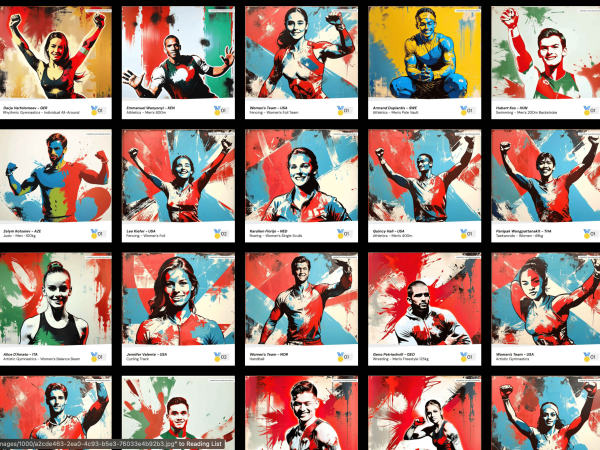Team Germany made history in Paris by becoming the first Olympic team to utilize generative AI to present all its athletes to the world.
This innovative use of generative AI allowed for the creation of stunning artworks that were not only showcased at the German House in Paris but also gained widespread recognition on social media. Prominent influencers like Alica Schmidt, who boasts over 5 million followers on Instagram, shared these artworks, helping to spread DSM's vision of modern and digital sports marketing on a global scale.
Building on the success of DSM's project for Team Germany, the concept was further developed. DECAID Systems expanded the idea by depicting gold medalists from around the world in a pop-art style, using the colors of their respective countries. This demonstrated how easily new campaigns can be built and executed based on a single generative AI project. While generative AI isn’t a one-size-fits-all solution, when applied to the right use cases, it opens up new experiences and pathways in sports marketing. Below, we highlight some of these use cases.
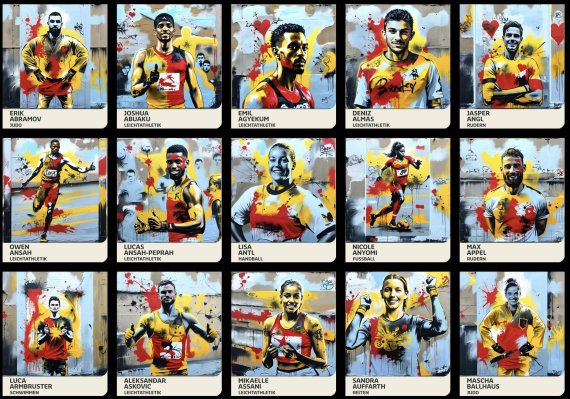
The complete image gallery of all the Olympic gold medalists from the 2024 Paris Games is now available for viewing. This gallery celebrates the remarkable achievements of these athletes, captured through stunning AI-generated artwork. Each image, designed in a vibrant street-art style, incorporates the bold colors of the athletes' home countries, creating a cohesive and powerful visual tribute. The use of advanced generative AI made the rapid and high-quality production of this gallery possible.
This project is a prime example of how generative AI can transform the sports industry. Beyond creating visually striking artwork, AI offers numerous benefits that can enhance different facets of the sports business. Here are 10 ways generative AI can help your sports organization achieve success:
The story that we just discussed is just one of the few examples of how the sports industry can benefit from generative AI tools.
Here are ten other ways GenAI is helping the industry:
Generative AI is a driving force behind the transformation of the sports industry. It can create personalized fan experience that enhance engagement and customer satisfaction. Ultra-personalization is just getting possible because of AI, as sports brands can now tailor interactions to customers personal needs. This personalization is applied across several platforms, reaching from social media and gaming to other digital media as well.
A special form of generative AI that is often used is Augmented Reality, or AR in short. Using AR enables novel ways of interaction between brands and their customers. For instance, fans can experience live games with virtually added content like statistics for a more in-depth viewing experience. This helps to include every fan, as people who are unable to attend an event now have more possibilities to access information and enjoy the things they love. Overall, generative AI is enabling more natural-feeling and tailored interactions which help to increase the bond between sports teams and their fans.
Interactive content is drawing more and more sports enthusiast into its ban, regardless of where they are accessing it. This type of content is a key factor to fan engagement, as it transforms the passive consumption of content into active participation which is highly valued in today’s digital landscape.
The creation of creative social media content that is putting fans first is traditionally hard. But sports organizations now have many tools that help with the creation process, like ChatGPT, Midjourney or Stable Diffusion. The generative AI tools can create text and images from a simple prompt, making the process of engaging and interactive content production easier than ever.
Interactive content has various formats. But whether it be polls, quizzes or live chats or streams, it is especially effective in enhancing fan engagement. The opportunity to interact directly with their favorite team and athletes can help fostering a sense of community and belonging. Leveraging these interactive elements can help improving their performance in these audience groups, creating memorable fan interactions along the way.
Generative AI tools like ChatGPT or Claude are two of the most used tools for text-based content creation. But technology has advanced even more: one standout example is The Six, an automated game-recap generation tool developed by WMT. The program can create detailed game recaps using OpenAI software, helping athletics departments to save time and resources. As game content is created automatically, the communications teams can put more focus on strategic storytelling and relations-building.
But it’s not only the efficiency in the content creation itself that AI can improve, it also ensures a consistent style and tone of content. This consistency is crucial for maintaining a brands authenticity and helps with connecting to fans. And as AI tools continue to evolve, they offer an enormous potential to further customize content to match with existing style references.
Another effective use case of AI in sports are targeted campaigns. As different sporting events attract different Groups of the audience there are special AI tools who help them section these. Amounts of data is being analyzed so that the AI can help tailor advertisements and campaigns to specific audience groups.
For example, higher ticket sales for all types of events can be the outcome of this process which increases the success of marketing efforts. By getting to know the different behaviors and preferences that help understand the audience marketers can make messages more specific.
Also, the ability to produce more efficient content can save a lot of time. With this the responding time to market trends or audience feedback is decreasing because marketers now know what is relevant.
This will not only build a stronger connection with their audience but also help improve their marketing strategies.
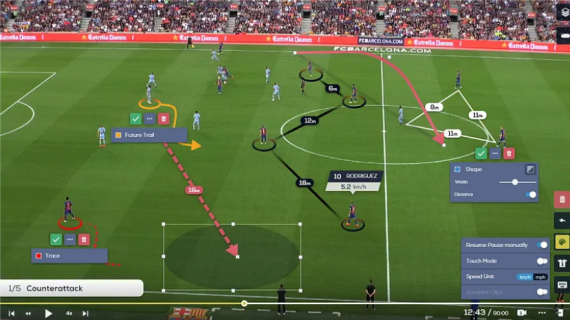
AI is a perfect tool for data analysis and used in various sectors – including sports. In the NBA teams like the Philadelphia 76ers utilize AI for data visualization and hypothesis testing to analyze NBA games. As these are critical insights and help to gain advantages over opponents, AI can help to make data-driven decisions that enhance performance.
But AI powered data analytics is used beyond just strategy development, as it can be used in real time during games. This helps making decisions in the heat of the game easier for coaches as well as medical staff as AI can provide injury prevention measures and optimal tactics. These kinds of analyses have been done for a long time now, but AI can make the difference between a good and an exceptional analysis.
As mentioned, predictive analytics can help addressing one of athlete’s biggest challenge: injuries. Until now, injuries were only treatable after they occurred. But AI-powered tools can anticipate injuries and give specific prevention measures. This is done by collecting as much fitness data as possible about athletes, so AI can find patterns and predict future injuries – known as machine learning. A study published on MDPI demonstrates how machine learning can predict soccer injuries by examining data from the player’s training workloads. Teams that are using predictive analytics have less injured players, giving them a crucial advantage over teams that use common injury treatments. This data-driven approach ensures that athletes can maintain their peak performance levels while reducing the risk of injuries, ultimately extending their careers.
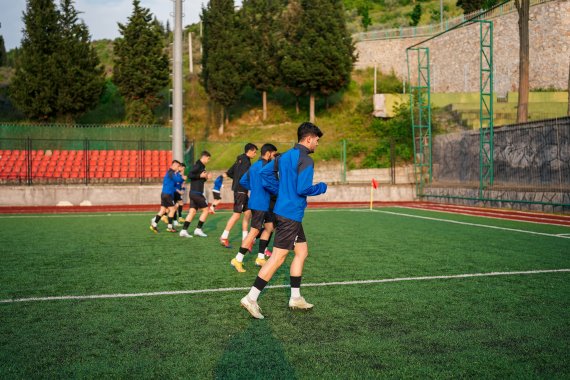
Efficiency is key in every economic sector, and the sports industry is no different. Generative AI therefore can play a pivotal role in streamlining workflows and allows automating various processes. Therefore, employees can focus on important strategic tasks whilst staying productive, not having to worry about repetitive tasks.
AI technologies can automate all types of routine tasks, reaching from data entry over scheduling to content creation, reducing the required time and resources along the way. For instance and as seen in various case studies, AI-powered design tools can streamline research and development processes.
Resource management is crucial for every kind of business where efficient allocation and management of technology, human resources, and finances are essential for success – which is also the case in the sports industry. While human managers can effectively oversee resources, AI can often enhance this process by considering multiple diverse factors. By analyzing points like relevance, availability, and urgency, AI can help to ensure optimal resource management and allocation.
AI's ability to analyze vast amounts of data allows sports organizations to allocate resources more strategically, saving time and effort that can be redirected to other critical areas. This has been mentioned before, but additionally AI can assist in financial management by monitoring expenses and ensuring financial transparency and accountability.
Furthermore, AI-driven resource management systems can optimize the use of sports facilities and equipment. This helps to ensure these are well-maintained and meet safety standards. AI systems can already manage equipment, schedule facility usage, and implement maintenance protocols - ensuring athletes and staff are provided the best possible environment.
The former-mentioned management systems that incorporate AI solutions are also a powerful tool for achieving sustainability in the sports industry. Enhancing decision-making in fields like resource use and waste reduction, AI can contribute to the sustainability goals of sports organizations.
Resource optimization is one of the primary ways AI can be used to meet these goals. Using machine learning, AI can analyze large datasets to identify patterns – and more important – inefficiencies. With actionable insights provided, companies can reduce their carbon footprint and integrate sustainable practices. Whether it’s the stadium or the supply chain, AI can point out inefficiencies and thereby help lead reducing waste and unnecessary production.
Additionally, AI can play a crucial role in achieving the Sustainable Development Goals (SDGs) by 2030. It can enhance participant performance, optimize resource allocation, and elevate audience engagement - all while promoting social and economic development through sports. AI-driven solutions can streamline event planning, transportation, and crowd management, whilst still having sustainability in mind.
AI is the driving force behind many emerging technologies in the sports industry, enhancing performance, engagement, and operational efficiency. These technologies change almost everything: from how sports are played and managed to the way it is experienced by fans.
- Wearables for Real-Time Tracking
Wearable technology is revolutionizing athlete performance and safety by providing real-time insights into various physiological parameters. Devices such as smartwatches and fitness trackers monitor metrics like heart rate, speed, and distance – data that is crucial for predictive analytics. - Smart Training
AI-powered tools are enhancing training methodologies by providing personalized feedback and optimizing training regimens. These tools use machine-learning analyze large datasets to identify patterns and suggest improvements, helping athletes to maximize their potential while minimizing injury risks. - Referee Assistance
Technologies like footballs’ Video Assistant Referee (VAR) use AI to assist referees in making accurate decisions during games. Using cameras and sensors, VAR can provide real-time data on player movements and ball trajectories to the referees on the pitch – helping them to make the right, possibly game-deciding decisions. - Immersive Esports with AI and VR
The integration of AI and Virtual Reality (VR) is creating immersive experiences in esports and gaming. AI enhances gameplay by creating lifelike non-player characters (NPCs) and dynamic environments, making worlds feel less empty and more like reality. VR offers a new level of realism and interactivity, transforming the gaming experience. These emerging technologies harness the vast possibilities of AI to improve the overall efficiency and performance of the sports industry.
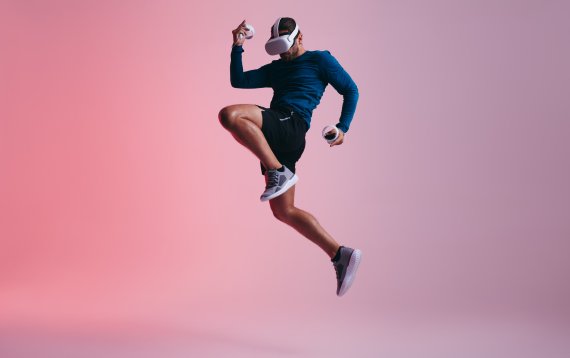
The benefits of using generative AI for sports companies are limitless. It helps improve the performance of athletes and teams while bolstering the efficiency of resource utilization and management. Using Gen AI, companies can also analyze data and create tailored marketing plans to improve ticket sales and event attendance.
Hence, it is easy to see why using AI is strategic and smart for sports companies. Keep an eye on the emerging AI technologies and trends in the sports industry to stay ahead of the competition.
AI in sports is here to stay.
 Sports BusinessSki Mountaineering Goes Olympic: What Milano-Cortina 2026 Means
Sports BusinessSki Mountaineering Goes Olympic: What Milano-Cortina 2026 Means
- ISPO awards
- Mountain sports
- Bike
- Design
- Retail
- Fitness
- Health
- ISPO Job Market
- ISPO Munich
- ISPO Shanghai
- Running
- Brands
- Sustainability
- Olympia
- OutDoor
- Promotion
- Sports Business
- ISPO Textrends
- Triathlon
- Water sports
- Winter sports
- eSports
- SportsTech
- OutDoor by ISPO
- Heroes
- Transformation
- Sport Fashion
- Urban Culture
- Challenges of a CEO
- Trade fairs
- Sports
- Find the Balance
- Product reviews
- Newsletter Exclusive Area
- Magazine
